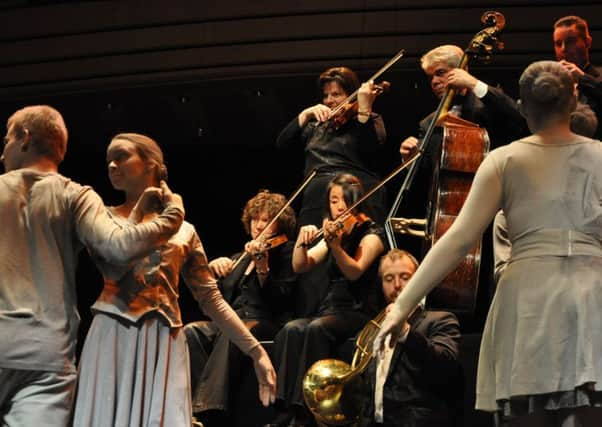Edinburgh International Festival: RSNO need no set to light Valkyrie's fire


On Saturday night, came the first of the staged performance with a new Scottish Opera/Opera Ventures co-production of Mark Anthony Turnage’s Greek, on the Oedipus myth, which had its premiere at the Festival in 1988. It’s nasty, scything stuff, assembled from Steven Berkoff’s eponymous play and given a contemporary update with screaming Brexit headlines and social malaise splashed across the white set.
Tenor Alex Otterburn as the Oedipal Stuart, trying to escape from Fate and Tuffnell Park, was devastating and terrifying, recoiling from the uncomfortable stereotypes of local Arsenal supporters to the even more odious yuppy wine bar drinkers, Thatcherite shoulder pads in place, to whose company he aspires. Director Joe Hill-Gibbins took a minimal approach on Johannes Schütz’ menacing revolving door set, but it was an unrelenting tale of horrors with inspired use of baked beans and live maggots as a societal mirror. Susan Bullock, Allison Cook and Andrew Shore were superb, as the man-child Stuart pulled out his own eyes then yelled “Bollocks to that”, a crushing indictment of the human condition.
Advertisement
Hide AdAdvertisement
Hide AdThere was a different twist on the presentation of opera a few nights later with Ivan Fischer’s “staged concert” of Mozart’s Don Giovanni. Perhaps it might have worked better in a smaller venue, but in the Edinburgh Festival Theatre it just looked like someone had forgotten the set. Static, visually dull at times, the performance seemed lost in a no man’s land between a fully staged production and the concert hall.
There was certainly little fault with the music, Fischer’s Mozart, with his Budapest Festival Orchestra, a fine and enunciated thing, with Laura Aikin’s Donna Anna and Lucy Crowe’s betrayed Donna Elvira beautifully sung. But the singers seemed set adrift under Fischer’s static stage direction, despite the dramatic efforts of the excellent Christopher Maltman as the irrepressible Don and Sylvia Schwartz as the tempted country girl Zerlina, on a black box set that looked, as my neighbour pointed out, rather like the rehearsal room.
Fischer tries to flesh it out – literally – with some fine young students from Budapest acting as the set, semi-clothed, semi-statues invoking the spirit of the vengeful Commendatore, but the conceit wears thin very quickly, despite some very effective moments as they formed themselves into a table made of bodies for the Don’s final dinner with Kristinn Sigmundsson’s somewhat underpowered Commendatore and a gaping hell mouth that bodily subsumed the Don into Hell.
In the end, it was in the Usher Hall that operatic mastery was achieved. No set, no costumes and no body stockings in Sunday’s magnificent concert performance of Wagner’s Die Walküre, the second instalment of the Festival’s Usher Hall Ring Cycle.
Thrilling, electrifying, the Royal Scottish National Orchestra were in breathtaking form under conductor Andrew Davis, who ratcheted up the tension with expert precision, bringing out all the shimmering colours, expression and brilliance of Wagner’s incomparable orchestration.
Bryn Terfel’s conflicted Wotan was powerfully nuanced, colluding with and raging against his daughter Brünnhilde, soprano Christine Goerke’s impassioned chief Valkyrie, caught on the cusp of childish enthusiasm and adult responsibility, and her stepmother, Fricka, a vituperative Karen Cargill. The Valkyries themselves flew with thrilling Wagnerian abandon and the cast performed with absolute dramatic conviction.
As the final fire flickered magically in the harps and flutes around the sleeping Brünnhilde, the overwhelming radiance of the final Act I love duet lingered in the mind between siblings Siegmund and Sieglinde, the immensely superb Simon O’Neill and Amber Wagner. The bar for next year’s Siegfried – and the rest of this year’s opera programme – has been set thrillingly high.